The whole point of this stupid tax, if you believe them. is to make gas so expensive it is economically unviable to drive. It has nothing to do with gas company profits. Why does he care that it got passed to consumers? Idiot.
Trudeau’s Newest New Carbon Tax
- Thread starter Ron in Regina
- Start date
You are using an out of date browser. It may not display this or other websites correctly.
You should upgrade or use an alternative browser.
You should upgrade or use an alternative browser.
Who else would it inevitably get passed onto? The government? As you have pointed out, isn’t that the point? To make getting to work to earn a living and pay our taxes or heating our homes in the winter so prohibitively expensive that we need to change our evil ways??The whole point of this stupid tax, if you believe them. is to make gas so expensive it is economically unviable to drive. It has nothing to do with gas company profits. Why does he care that it got passed to consumers? Idiot.
Forget about vacations by air as well. They need 23000 pilots yesterday so expect air to be too expensive as well.The whole point of this stupid tax, if you believe them. is to make gas so expensive it is economically unviable to drive. It has nothing to do with gas company profits. Why does he care that it got passed to consumers? Idiot.
Air Canada has already started cutting flights.
Actually the whole point is to raise government revenues without raising income tax or the gst , the rest is just b.s.The whole point of this stupid tax, if you believe them. is to make gas so expensive it is economically unviable to drive. It has nothing to do with gas company profits. Why does he care that it got passed to consumers? Idiot.
The government is creating a carve-out for the carbon tax on home heating oil, Prime Minister Justin Trudeau said Thursday.
The government will exempt home heating oil from the tax for three years, double the rural supplement in the rebate program and offer new programs Trudeau said will help rural Canadians switch to electric heat pumps….if they can afford them…& then what?
Exemption for three Years. It’s Oct 2023, so to October 2026 (not October 2025 when the next Federal Election will happen)…so how very transparent. While the exemption applies nationwide, Trudeau said the policy will help Atlantic Canada in particular. Thirty per cent of homeowners in the region still use furnace oil to heat their homes….& why Atlantic Canada? These are the 2021 Federal election results:

And….and these are the current projections:
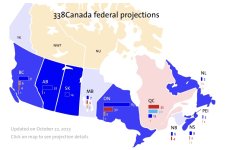
Just last year, the Conservatives put forward a non-binding motion to remove the carbon tax from home heating fuel. Most Liberal MPs voted against it. Oh well.

 apple.news
apple.news
The government will exempt home heating oil from the tax for three years, double the rural supplement in the rebate program and offer new programs Trudeau said will help rural Canadians switch to electric heat pumps….if they can afford them…& then what?
Exemption for three Years. It’s Oct 2023, so to October 2026 (not October 2025 when the next Federal Election will happen)…so how very transparent. While the exemption applies nationwide, Trudeau said the policy will help Atlantic Canada in particular. Thirty per cent of homeowners in the region still use furnace oil to heat their homes….& why Atlantic Canada? These are the 2021 Federal election results:

And….and these are the current projections:

Just last year, the Conservatives put forward a non-binding motion to remove the carbon tax from home heating fuel. Most Liberal MPs voted against it. Oh well.
Ottawa exempting home heating oil from carbon tax for 3 years, Trudeau says — CBC News
The government is creating a carve-out for the carbon tax on home heating oil, Prime Minister Justin Trudeau said Thursday.
Why aren't the Feds setting them up with a canola or cod liver oil based fuel?The government is creating a carve-out for the carbon tax on home heating oil, Prime Minister Justin Trudeau said Thursday.
The government will exempt home heating oil from the tax for three years, double the rural supplement in the rebate program and offer new programs Trudeau said will help rural Canadians switch to electric heat pumps….if they can afford them…& then what?
Exemption for three Years. It’s Oct 2023, so to October 2026 (not October 2025 when the next Federal Election will happen)…so how very transparent. While the exemption applies nationwide, Trudeau said the policy will help Atlantic Canada in particular. Thirty per cent of homeowners in the region still use furnace oil to heat their homes….& why Atlantic Canada? These are the 2021 Federal election results:
View attachment 19772
And….and these are the current projections:
View attachment 19773
Just last year, the Conservatives put forward a non-binding motion to remove the carbon tax from home heating fuel. Most Liberal MPs voted against it. Oh well.

Ottawa exempting home heating oil from carbon tax for 3 years, Trudeau says — CBC News
The government is creating a carve-out for the carbon tax on home heating oil, Prime Minister Justin Trudeau said Thursday.apple.news
Because it’s easier to collect the tax, then give back a portion to some, then brag that you’ve given back a portion of the tax collected to some…and expect gratitude and votes?Why aren't the Feds setting them up with a canola or cod liver oil based fuel?
We're often asked how homeowners with cold climate heat pumps can survive periods of intense cold below temperatures of -25°C to -30°C. In those temperatures, heat pumps may need to be backed up by a supplemental heat source.
One supplemental option is an all-electric set-up in which a heat pump is backed up by electric heaters within the system and/or with electric baseboards. This type of set up will keep your home comfortable on the coldest days and your greenhouse gas emissions to a minimum.

How heat pumps measure up against cold climates in B.C.
Air-source heat pump systems designed for northern climates are becoming more popular in Norway, the U.S., and Canada.
Cold climate air source heat pumps have been designed to work in lower temperatures well below freezing and can now work down to –25°C temperatures.
Heat pumps for the Oil to Heat Pump Affordability program
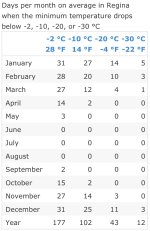
Now I’m just looking here because this is where I live, and I’m just look up the coldest day each year for the last decade or so….And these bastards come in stretches as opposed to individual days…
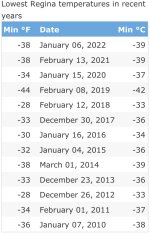
I would like to keep my natural gas furnace. Thank you.
I did geothermal 15 years ago but went back to gas. It can't handle our swings or those week long bone chilling Arctic highs. Didn't save a damn thing money wise thanks to needing space heaters. We'd need two air to air systems. The main forced air unit and an exterior wall mount unit.Because it’s easier to collect the tax, then give back a portion to some, then brag that you’ve given back a portion of the tax collected to some…and expect gratitude and votes?
It takes heat from the air outside your home and moves it indoors, and in summer, it works like an air conditioner to pump heat out of your home. While typical heat pumps are efficient to lows of -8°C, there are models that can work in temperatures down to -30°C.
We're often asked how homeowners with cold climate heat pumps can survive periods of intense cold below temperatures of -25°C to -30°C. In those temperatures, heat pumps may need to be backed up by a supplemental heat source.
One supplemental option is an all-electric set-up in which a heat pump is backed up by electric heaters within the system and/or with electric baseboards. This type of set up will keep your home comfortable on the coldest days and your greenhouse gas emissions to a minimum.
So…. They’re designed for the climate in part of our winter, but not all of our winter. Great….
How heat pumps measure up against cold climates in B.C.
Air-source heat pump systems designed for northern climates are becoming more popular in Norway, the U.S., and Canada.www.bchydro.com
Cold climate air source heat pumps have been designed to work in lower temperatures well below freezing and can now work down to –25°C temperatures.
So, on average, in Regina, it’s only -30°C for at fraction of the year, and the graph doesn’t show how far below -30°C for that accumulative month on average…& living here, I really doubt the graphs accuracy…Heat pumps for the Oil to Heat Pump Affordability program
natural-resources.canada.ca
View attachment 19774
Now I’m just looking here because this is where I live, and I’m just look up the coldest day each year for the last decade or so….And these bastards come in stretches as opposed to individual days…
View attachment 19775
I would like to keep my natural gas furnace. Thank you.
The only benefit is they become AC at the flip of switch.
The big problem is do we have the grid capacity to run heat pumps and charge vehicles? Answer is "no".
Last edited:
But the space heaters you used, where they electric or electric?I did geothermal back went back to gas. It can't handle our swings or those week long bone chilling Arctic highs. Didn't save a damn thing thanks to needing space heaters. We'd need two systems. The main forced air unit and an exterior wall mount unit.
The only benefit is they become AC at the flip of switch.
The big problem is do we have the grid capacity to run heat pumps and charge vehicles? Answer is "no".
Electric and electric.But the space heaters you used, where they electric or electric?
After spending months attacking anyone who suggested the idea, Justin Trudeau announced Thursday he will suspend the carbon tax on home heating oil.
But the Prime Minister maintains his new plan will be better for the environment than his old plan, which he assured us was the one we needed to follow to avoid the end of the world.
Lest you think that’s an exaggeration, Trudeau has said all of those things and he’s done it with a straight face.
It’s clear Trudeau and his brain trust looked at the polls, looked at the seat projections that said they would be reduced to one seat in Newfoundland, and see a significant reduction across Atlantic Canada. With Pierre Poilievre going across the country holding huge rallies where he promises to “axe the tax,” Trudeau is obviously feeling the heat.
“We’re adjusting policies so that they have the right outcome,” Trudeau said.

 apple.news
“We are doubling down on our fight against climate change and keeping true to the principles that we are supporting Canadians while we fight climate change.”
apple.news
“We are doubling down on our fight against climate change and keeping true to the principles that we are supporting Canadians while we fight climate change.”
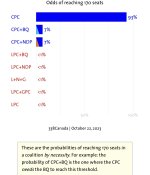
Couldn’t that be read as realizing he would be wiped out in the polls in Atlantic Canada and deciding to change course? There are 350,000 homes, meaning close to 1 million people, across Ontario who live in homes heated by oil, but he’s never cared about them because they live in rural Ontario and don’t vote for his party, unlike the voters in Atlantic Canada.

“Is this about not wanting to lose a bunch of Atlantic Canadian MPs?” National Post’s Ryan Tumilty asked Trudeau. He dismissed the idea that he would ever adjust his policies for crass political considerations.
“The highest PROPORTION of people with home heating oil across the country are in Atlantic Canada and that’s why it hit them particularly hard,” Trudeau said….oh, like measuring carbon footprint, based on population, and not landmass, to get the answer wanted politically?? That kind of proportion?? He didn’t want to touch the fact that his party currently holds 24 of 32 seats in Atlantic Canada and is about to face a wipe out over this issue.
Since Ottawa has put a pause on the carbon tax for heating oil, a compelling case can be made for examining the impact on our entire food supply.

 apple.news
apple.news
But the Prime Minister maintains his new plan will be better for the environment than his old plan, which he assured us was the one we needed to follow to avoid the end of the world.
Lest you think that’s an exaggeration, Trudeau has said all of those things and he’s done it with a straight face.
It’s clear Trudeau and his brain trust looked at the polls, looked at the seat projections that said they would be reduced to one seat in Newfoundland, and see a significant reduction across Atlantic Canada. With Pierre Poilievre going across the country holding huge rallies where he promises to “axe the tax,” Trudeau is obviously feeling the heat.
“We’re adjusting policies so that they have the right outcome,” Trudeau said.
LILLEY: Trudeau flip flops on carbon tax for heating oil as his support cools — Toronto Sun
As Pierre Poilievre holds rallies across the country promising to “axe the tax,” the PM must be feeling the heat

Couldn’t that be read as realizing he would be wiped out in the polls in Atlantic Canada and deciding to change course? There are 350,000 homes, meaning close to 1 million people, across Ontario who live in homes heated by oil, but he’s never cared about them because they live in rural Ontario and don’t vote for his party, unlike the voters in Atlantic Canada.

“Is this about not wanting to lose a bunch of Atlantic Canadian MPs?” National Post’s Ryan Tumilty asked Trudeau. He dismissed the idea that he would ever adjust his policies for crass political considerations.
“The highest PROPORTION of people with home heating oil across the country are in Atlantic Canada and that’s why it hit them particularly hard,” Trudeau said….oh, like measuring carbon footprint, based on population, and not landmass, to get the answer wanted politically?? That kind of proportion?? He didn’t want to touch the fact that his party currently holds 24 of 32 seats in Atlantic Canada and is about to face a wipe out over this issue.
Since Ottawa has put a pause on the carbon tax for heating oil, a compelling case can be made for examining the impact on our entire food supply.
CHARLEBOIS: Carbon Tax: Now, let’s talk about our food supply — Toronto Sun
Ottawa has temporarily halted the carbon tax on home heating oil. That's a positive step. But now, can we shift our focus to discuss the state of our food supply chain?
It turns out desperate pigs really do fly.
In a colossal policy reversal, Prime Minister Justin Trudeau announced a suspension of the carbon tax on home heating oil for the next three years. But that one concession favours one region over others and is far from enough to protect Canadians from the brutal realities of the carbon tax’s impact on family budgets.
Trudeau’s carbon tax concession was specifically targeted at Atlantic Canada because it deals with home heating oil. Forty per cent of Atlantic Canadian households use heating oil to heat their homes. Compare that to just 4% of Ontario households.
Atlantic Canada had a special deal with Trudeau until this summer. The federal government gave Atlantic provinces permission to exempt home heating oil from their carbon taxes.
But the region’s special deal ran out in July, with full federal carbon tax pricing kicking in on Canada Day, including on heating oil.
With winter fast approaching, taxpayers in Atlantic Canada recognized the massive tax hike they were about to face just to stay warm. “Welcome to the club!!”
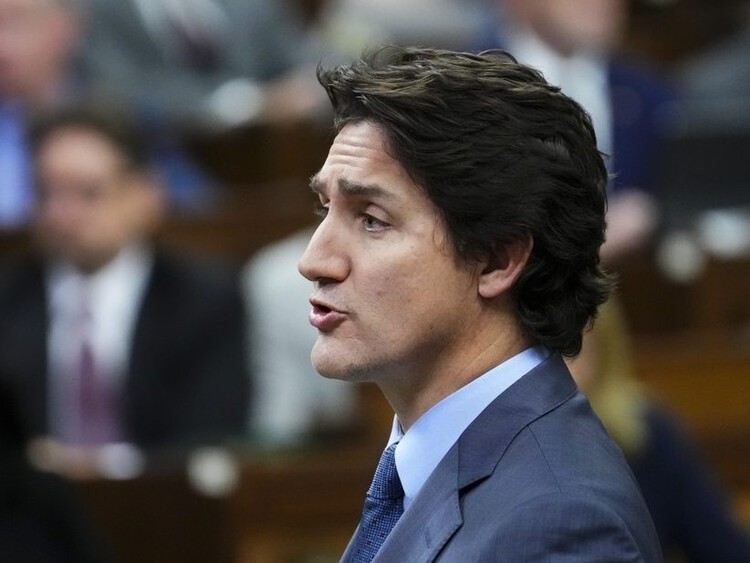
 apple.news
Most Ontario households use natural gas to heat their homes. It’s cleaner than home heating oil, but Trudeau is keeping the carbon tax on natural gas in place. That’s proof that this is all about politics.
apple.news
Most Ontario households use natural gas to heat their homes. It’s cleaner than home heating oil, but Trudeau is keeping the carbon tax on natural gas in place. That’s proof that this is all about politics.
Families in every province will still pay carbon taxes at the pumps when filling up to drive the kids to school. And food will still be more expensive because truckers who ship the food and farmers who produce the food will still be paying carbon taxes on fuel.
It’s time for Trudeau to stop driving up the cost of living and dividing Canadians based on political calculations. The feds need to axe the carbon tax on everything everywhere, no matter the postal code.
In a colossal policy reversal, Prime Minister Justin Trudeau announced a suspension of the carbon tax on home heating oil for the next three years. But that one concession favours one region over others and is far from enough to protect Canadians from the brutal realities of the carbon tax’s impact on family budgets.
Trudeau’s carbon tax concession was specifically targeted at Atlantic Canada because it deals with home heating oil. Forty per cent of Atlantic Canadian households use heating oil to heat their homes. Compare that to just 4% of Ontario households.
Atlantic Canada had a special deal with Trudeau until this summer. The federal government gave Atlantic provinces permission to exempt home heating oil from their carbon taxes.
But the region’s special deal ran out in July, with full federal carbon tax pricing kicking in on Canada Day, including on heating oil.
With winter fast approaching, taxpayers in Atlantic Canada recognized the massive tax hike they were about to face just to stay warm. “Welcome to the club!!”
GOLDBERG: Trudeau’s home heating oil exemption shows politics trumps real affordability — Toronto Sun
It turns out desperate pigs really do fly. In a colossal policy reversal, Prime Minister Justin Trudeau announced a suspension of the carbon tax on home heating oil for the next three years. But that one concession favours one region over others and is far from enough to protect Canadians from...
Families in every province will still pay carbon taxes at the pumps when filling up to drive the kids to school. And food will still be more expensive because truckers who ship the food and farmers who produce the food will still be paying carbon taxes on fuel.
It’s time for Trudeau to stop driving up the cost of living and dividing Canadians based on political calculations. The feds need to axe the carbon tax on everything everywhere, no matter the postal code.
Only a citiot could come up with something that dumb. Even out here, it is not uncommon for rural areas to go without power for several days. How big a diesel genset does one need to heat a house at -40?One supplemental option is an all-electric set-up in which a heat pump is backed up by electric heaters within the system and/or with electric baseboards. This type of set up will keep your home comfortable on the coldest days and your greenhouse gas emissions to a minimum.

How heat pumps measure up against cold climates in B.C.
Air-source heat pump systems designed for northern climates are becoming more popular in Norway, the U.S., and Canada.www.bchydro.com
So, basically another fuck the west to buy votes in the East Liberal plan.It turns out desperate pigs really do fly.
In a colossal policy reversal, Prime Minister Justin Trudeau announced a suspension of the carbon tax on home heating oil for the next three years. But that one concession favours one region over others and is far from enough to protect Canadians from the brutal realities of the carbon tax’s impact on family budgets.
Trudeau’s carbon tax concession was specifically targeted at Atlantic Canada because it deals with home heating oil. Forty per cent of Atlantic Canadian households use heating oil to heat their homes. Compare that to just 4% of Ontario households.
Atlantic Canada had a special deal with Trudeau until this summer. The federal government gave Atlantic provinces permission to exempt home heating oil from their carbon taxes.
But the region’s special deal ran out in July, with full federal carbon tax pricing kicking in on Canada Day, including on heating oil.
With winter fast approaching, taxpayers in Atlantic Canada recognized the massive tax hike they were about to face just to stay warm. “Welcome to the club!!”
Most Ontario households use natural gas to heat their homes. It’s cleaner than home heating oil, but Trudeau is keeping the carbon tax on natural gas in place. That’s proof that this is all about politics.
GOLDBERG: Trudeau’s home heating oil exemption shows politics trumps real affordability — Toronto Sun
It turns out desperate pigs really do fly. In a colossal policy reversal, Prime Minister Justin Trudeau announced a suspension of the carbon tax on home heating oil for the next three years. But that one concession favours one region over others and is far from enough to protect Canadians from...apple.news
Families in every province will still pay carbon taxes at the pumps when filling up to drive the kids to school. And food will still be more expensive because truckers who ship the food and farmers who produce the food will still be paying carbon taxes on fuel.
It’s time for Trudeau to stop driving up the cost of living and dividing Canadians based on political calculations. The feds need to axe the carbon tax on everything everywhere, no matter the postal code.
So, basically another fuck the west to buy votes in the East Liberal plan.
Meh, my carbon tax refund went to paying into what I owe, lowered that payment for me which I honestly was grateful for.
For me it's not all bad I guess.
For me it's not all bad I guess.
If there were no carbon to pay you'd have the money to make bigger payments right away.Meh, my carbon tax refund went to paying into what I owe, lowered that payment for me which I honestly was grateful for.
For me it's not all bad I guess.
Money you pay on carbon tax today doesn't come back for 18 months.
Why is paying 18 more months of interest on your debt "not all that bad"?
The spectacular backflip by Prime Minister Justin Trudeau this week left you wondering if he’s an acrobat or fish out of water, flopping around on the dock.
This is three months ago, in a Liberal stronghold, where as many of us have been dealing with this annually escalating tax(s) for years now:
His about-face on a major policy at the heart of what his government is all about is as dizzying as it was predictable.
Flanked by MPs from Atlantic Canada, Trudeau announced his government will exempt home heating oil from the carbon tax and increase the rural rebate — from 10% to 20%.

 www.youtube.com
The move was all the more astonishing given that just a year ago his government voted a resounding ‘no’ to a Conservative motion that proposed to do the same thing….
www.youtube.com
The move was all the more astonishing given that just a year ago his government voted a resounding ‘no’ to a Conservative motion that proposed to do the same thing….

 apple.news
apple.news
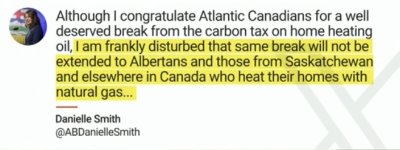 (When natural gas is burned, it produces mostly carbon dioxide and water vapor -- the same substances emitted when humans exhale. Compared with some other fossil fuels, natural gas emits the least amount of carbon dioxide into the air when combusted -- making natural gas the cleanest burning fossil fuel of all, but that’s not applicable to the Liberal/NDP vote purchasing in the Eastern provinces currently)
(When natural gas is burned, it produces mostly carbon dioxide and water vapor -- the same substances emitted when humans exhale. Compared with some other fossil fuels, natural gas emits the least amount of carbon dioxide into the air when combusted -- making natural gas the cleanest burning fossil fuel of all, but that’s not applicable to the Liberal/NDP vote purchasing in the Eastern provinces currently)
Now, saving the Spotted Whales or the Feminist Owls aside, the four Maritime Provinces have diverse electrical generating sources, & New Brunswick even has nuclear (kudos!), but let’s look at Nova Scotia’s at this point, to see where the electricity to power these heat pumps will come from:
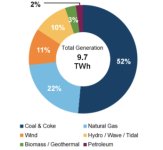
So replacing home heating with heating oil to heat pump’s powered by predominantly coal & coke there (or heating oil?), aside from a huge expense, accomplishes what exactly? A heat pump could be a good value in some conditions as a supplement to forced-air or in-floor gas or fuel-oil heat with adequate public subsidies, but they're not a sufficient substitute in most parts of Canada.

 atlantic.ctvnews.ca
atlantic.ctvnews.ca
This is three months ago, in a Liberal stronghold, where as many of us have been dealing with this annually escalating tax(s) for years now:
Flanked by MPs from Atlantic Canada, Trudeau announced his government will exempt home heating oil from the carbon tax and increase the rural rebate — from 10% to 20%.

The carbon tax won't make you money (despite what the Liberals say)
When you hear the Trudeau government talking up the carbon tax, you’d think they’d highlight the fact that it reduces emissions by making fossil fuels more e...
EDITORIAL: Tax break is about politics, not people — Toronto Sun
The spectacular backflip by Prime Minister Justin Trudeau this week left you wondering if he’s an acrobat or fish out of water, flopping around on the dock. His about-face on a major policy at the heart of what his government is all about is as dizzying as it was predictable. Flanked by MPs from...
 (When natural gas is burned, it produces mostly carbon dioxide and water vapor -- the same substances emitted when humans exhale. Compared with some other fossil fuels, natural gas emits the least amount of carbon dioxide into the air when combusted -- making natural gas the cleanest burning fossil fuel of all, but that’s not applicable to the Liberal/NDP vote purchasing in the Eastern provinces currently)
(When natural gas is burned, it produces mostly carbon dioxide and water vapor -- the same substances emitted when humans exhale. Compared with some other fossil fuels, natural gas emits the least amount of carbon dioxide into the air when combusted -- making natural gas the cleanest burning fossil fuel of all, but that’s not applicable to the Liberal/NDP vote purchasing in the Eastern provinces currently)Now, saving the Spotted Whales or the Feminist Owls aside, the four Maritime Provinces have diverse electrical generating sources, & New Brunswick even has nuclear (kudos!), but let’s look at Nova Scotia’s at this point, to see where the electricity to power these heat pumps will come from:

So replacing home heating with heating oil to heat pump’s powered by predominantly coal & coke there (or heating oil?), aside from a huge expense, accomplishes what exactly? A heat pump could be a good value in some conditions as a supplement to forced-air or in-floor gas or fuel-oil heat with adequate public subsidies, but they're not a sufficient substitute in most parts of Canada.

Nova Scotia Power plans to produce electricity with fuel oil until 2050 instead of with coal
Nova Scotia's power utility plans to convert a coal-burning electricity station in Cape Breton to burn heavy fuel oil once federal regulations phase out coal entirely in 2030.
In Atlantic Canada, the average consumption can be up to 1,500 litres. Oil-heated homes in Canada can expect to spend $2,100 to $3,000 per year on heating fuel, not including the cost of the fuel charge on light fuel oil used for heating.14 hours ago
https://www.canada.ca ›
But...
How much canola to make a Litre of oil?
You do the calculations... 1 bushel (aboot 25kg) of canola seed can make approximately 11 litres of oil. Canola seeds are crushed into two component parts: oil and meal. The oil and meal are then manufactured into a variety of products.
https://canolagrowers.com
https://www.canada.ca ›
But...
How much canola to make a Litre of oil?
You do the calculations... 1 bushel (aboot 25kg) of canola seed can make approximately 11 litres of oil. Canola seeds are crushed into two component parts: oil and meal. The oil and meal are then manufactured into a variety of products.
https://canolagrowers.com
Last edited: